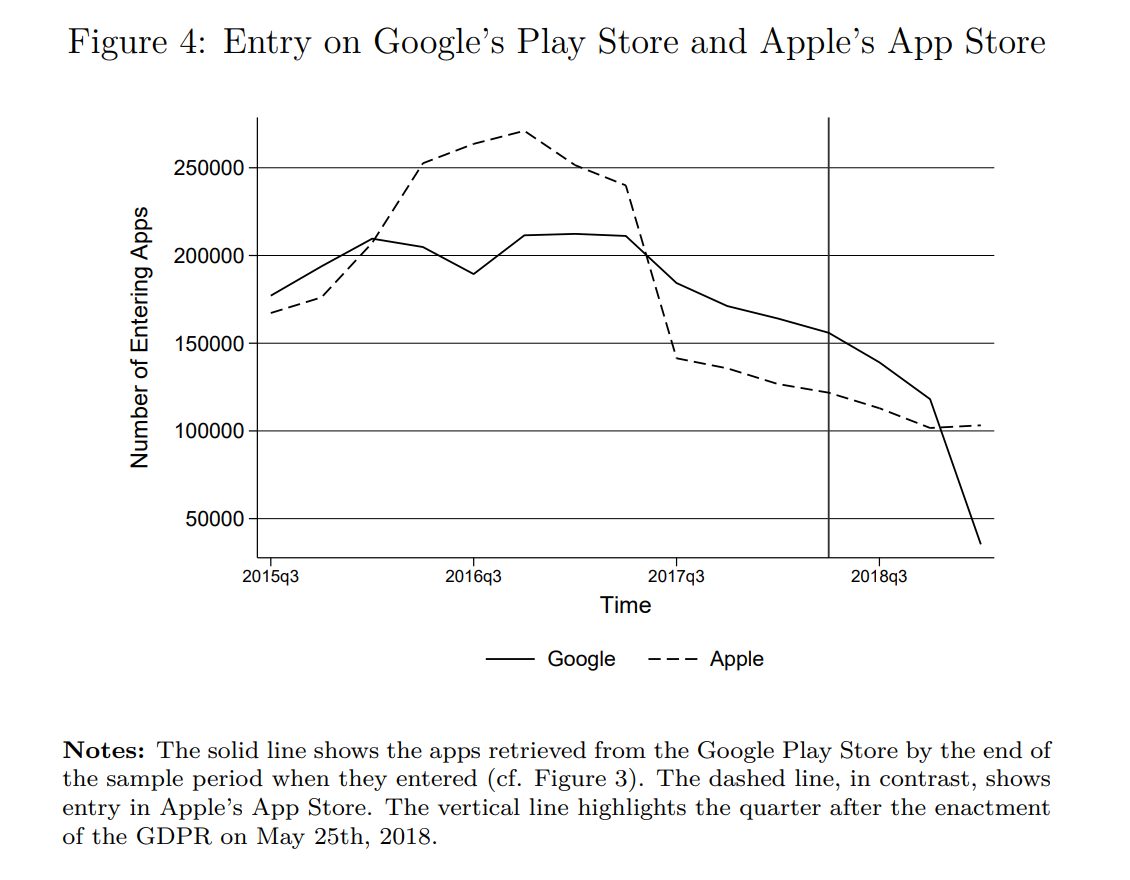Safeguarding the privacy of average users has been a massive priority for world governments because of the fact that this is the sort of thing that could potentially end up keeping money hungry corporations at bay. However, any law that is passed which seeks to implement such widespread regulation on any given industry would likely end up having a few unintended consequences as well, and a new paper that compiles research conducted by numerous economists has revealed that GDPR in particular has been detrimental to the Android app industry.
This research involved an analysis of well over 4 million apps that currently exist on the Play Store, and it revealed that around 47.2% fewer apps were created after GDPR was first implemented back in 2018. App usage for the rest of the apps that existed on the Play Store fell by over 45 percent as well with all things having been considered and taken into account. The paper seems to be trying to paint a picture that this regulation has killed innovation, but in spite of the fact that this is the case that is not the whole story.
With all of that having been said and now out of the way, it is important to note that the apps that remained on the Play Store have seen revenues almost double since 2016, going from 43.6 billion dollars to a massive 83.6 billion in 2019. That indicates that GDPR didn’t kill the industry, instead it just made it harder for low quality apps to stay on the Play Store. The apps that had to be removed were not innovative, rather they were low quality apps that just wanted to harvest user data.
Also, the total number of app users for Android phones has increased, and most surviving apps that complied with GDPR saw their user base increase as people came to them after not being able to use other apps that were not valuing their privacy. There often seems to be a rather huge emphasis placed on choice, as if having millions of choices is inherently a good thing. However, when the vast majority of these options use underhanded techniques to violate your privacy, one must question whether this is actually freedom of choice or of it is just a surface level interpretation of the term.
Data protection laws might be reducing the quantity of apps being put out, but it’s hard to argue against the truth that they have improved average app quality by large margins. Users can now safely use the apps that they need because the industry is not going anywhere, instead it is just becoming safer.
Read next: Data Compromises Affected Over 20 Million Users In The United States Alone, According To A Q1 2022 Report From ITRC
This research involved an analysis of well over 4 million apps that currently exist on the Play Store, and it revealed that around 47.2% fewer apps were created after GDPR was first implemented back in 2018. App usage for the rest of the apps that existed on the Play Store fell by over 45 percent as well with all things having been considered and taken into account. The paper seems to be trying to paint a picture that this regulation has killed innovation, but in spite of the fact that this is the case that is not the whole story.
With all of that having been said and now out of the way, it is important to note that the apps that remained on the Play Store have seen revenues almost double since 2016, going from 43.6 billion dollars to a massive 83.6 billion in 2019. That indicates that GDPR didn’t kill the industry, instead it just made it harder for low quality apps to stay on the Play Store. The apps that had to be removed were not innovative, rather they were low quality apps that just wanted to harvest user data.
Also, the total number of app users for Android phones has increased, and most surviving apps that complied with GDPR saw their user base increase as people came to them after not being able to use other apps that were not valuing their privacy. There often seems to be a rather huge emphasis placed on choice, as if having millions of choices is inherently a good thing. However, when the vast majority of these options use underhanded techniques to violate your privacy, one must question whether this is actually freedom of choice or of it is just a surface level interpretation of the term.
Data protection laws might be reducing the quantity of apps being put out, but it’s hard to argue against the truth that they have improved average app quality by large margins. Users can now safely use the apps that they need because the industry is not going anywhere, instead it is just becoming safer.
Read next: Data Compromises Affected Over 20 Million Users In The United States Alone, According To A Q1 2022 Report From ITRC


